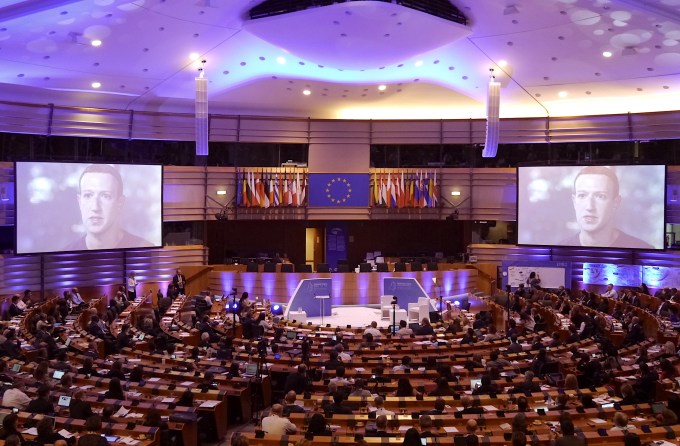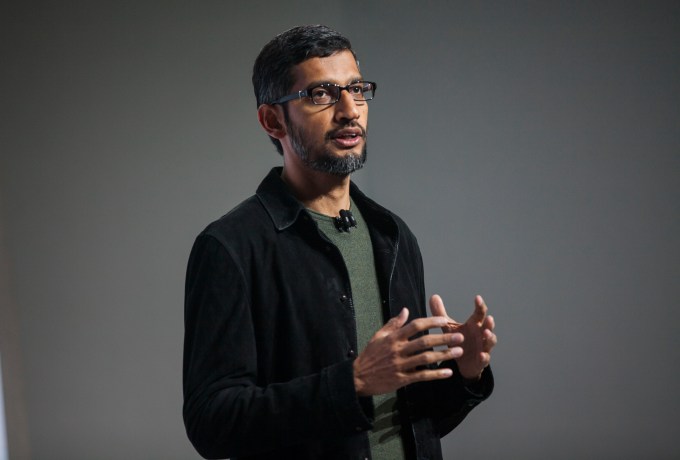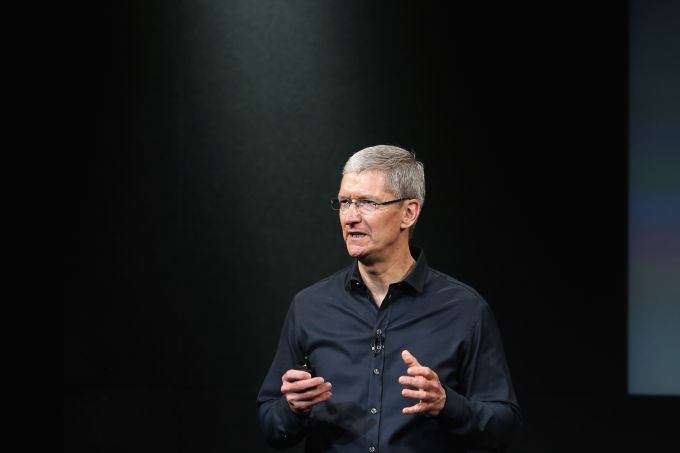Facebook founder Mark Zuckerberg’s visage loomed large over the European parliament this week, both literally and figuratively, as global privacy regulators gathered in Brussels to interrogate the human impacts of technologies that derive their power and persuasiveness from our data.
The eponymous social network has been at the center of a privacy storm this year. And every fresh Facebook content concern — be it about discrimination or hate speech or cultural insensitivity — adds to a damaging flood.
The overarching discussion topic at the privacy and data protection confab, both in the public sessions and behind closed doors, was ethics: How to ensure engineers, technologists and companies operate with a sense of civic duty and build products that serve the good of humanity.
So, in other words, how to ensure people’s information is used ethically — not just in compliance with the law. Fundamental rights are increasingly seen by European regulators as a floor not the ceiling. Ethics are needed to fill the gaps where new uses of data keep pushing in.
As the EU’s data protection supervisor, Giovanni Buttarelli, told delegates at the start of the public portion of the International Conference of Data Protection and Privacy Commissioners: “Not everything that is legally compliant and technically feasible is morally sustainable.”
As if on cue Zuckerberg kicked off a pre-recorded video message to the conference with another apology. Albeit this was only for not being there to give an address in person. Which is not the kind of regret many in the room are now looking for, as fresh data breaches and privacy incursions keep being stacked on top of Facebook’s Cambridge Analytica data misuse scandal like an unpalatable layer cake that never stops being baked.
Evidence of a radical shift of mindset is what champions of civic tech are looking for — from Facebook in particular and adtech in general.
But there was no sign of that in Zuckerberg’s potted spiel. Rather he displayed the kind of masterfully slick PR manoeuvering that’s associated with politicians on the campaign trail. It’s the natural patter for certain big tech CEOs too, these days, in a sign of our sociotechnical political times.
(See also: Facebook hiring ex-UK deputy PM, Nick Clegg, to further expand its contacts database of European lawmakers.)

And so the Facebook founder seized on the conference’s discussion topic of big data ethics and tried to zoom right back out again. Backing away from talk of tangible harms and damaging platform defaults — aka the actual conversational substance of the conference (from talk of how dating apps are impacting how much sex people have and with whom they’re doing it; to shiny new biometric identity systems that have rebooted discriminatory caste systems) — to push the idea of a need to “strike a balance between speech, security, privacy and safety”.
This was Facebook trying reframe the idea of digital ethics — to make it so very big-picture-y that it could embrace his people-tracking ad-funded business model as a fuzzily wide public good, with a sort of ‘oh go on then’ shrug.
Indeed, he went further, saying Facebook believes it has an “ethical obligation to protect good uses of technology”.
And from that self-serving perspective almost anything becomes possible — as if Facebook is arguing that breaking data protection law might really be the ‘ethical’ thing to do. (Or, as the existentialists might put it: ‘If god is dead, then everything is permitted’.)
It’s an argument that radically elides some very bad things, though. And glosses over problems that are systemic to Facebook’s ad platform.
A little later, Google’s CEO Sundar Pichai also dropped into the conference in video form, bringing much the same message.
“The conversation about ethics is important. And we are happy to be a part of it,” he began, before an instant hard pivot into referencing Google’s founding mission of “organizing the world’s information — for everyone” (emphasis his), before segwaying — via “knowledge is empowering” — to asserting that “a society with more information is better off than one with less”.
Is having access to more information of unknown and dubious or even malicious provenance better than having access to some verified information? Google seems to think so.

SAN FRANCISCO, CA – OCTOBER 04: Pichai Sundararajan, known as Sundar Pichai, CEO of Google Inc. speaks during an event to introduce Google Pixel phone and other Google products on October 4, 2016 in San Francisco, California. The Google Pixel is intended to challenge the Apple iPhone in the premium smartphone category. (Photo by Ramin Talaie/Getty Images)
The pre-recorded Pichai didn’t have to concern himself with all the mental ellipses bubbling up in the thoughts of the privacy and rights experts in the room.
“Today that mission still applies to everything we do at Google,” his digital image droned on, without mentioning what Google is thinking of doing in China. “It’s clear that technology can be a positive force in our lives. It has the potential to give us back time and extend opportunity to people all over the world.
“But it’s equally clear that we need to be responsible in how we use technology. We want to make sound choices and build products that benefit society that’s why earlier this year we worked with our employees to develop a set of AI principles that clearly state what types of technology applications we will pursue.”
Of course it sounds fine. Yet Pichai made no mention of the staff who’ve actually left Google because of ethical misgivings. Nor the employees still there and still protesting its ‘ethical’ choices.
It’s not almost as if the Internet’s adtech duopoly is singing from the same ‘ads for greater good trumping the bad’ hymn sheet; the Internet’s adtech’s duopoly is doing exactly that.
The ‘we’re not perfect and have lots more to learn’ line that also came from both CEOs seems mostly intended to manage regulatory expectation vis-a-vis data protection — and indeed on the wider ethics front.
They’re not promising to do no harm. Nor to always protect people’s data. They’re literally saying they can’t promise that. Ouch.
Meanwhile, another common FaceGoog message — an intent to introduce ‘more granular user controls’ — just means they’re piling even more responsibility onto individuals to proactively check (and keep checking) that their information is not being horribly abused.
This is a burden neither company can speak to in any other fashion. Because the solution is that their platforms not hoard people’s data in the first place.
The other ginormous elephant in the room is big tech’s massive size; which is itself skewing the market and far more besides.
Neither Zuckerberg nor Pichai directly addressed the notion of overly powerful platforms themselves causing structural societal harms, such as by eroding the civically minded institutions that are essential to defend free societies and indeed uphold the rule of law.
Of course it’s an awkward conversation topic for tech giants if vital institutions and societal norms are being undermined because of your cut-throat profiteering on the unregulated cyber seas.
A great tech fix to avoid answering awkward questions is to send a video message in your CEO’s stead. And/or a few minions. Facebook VP and chief privacy officer, Erin Egan, and Google’s SVP of global affairs Kent Walker, were duly dispatched and gave speeches in person.
They also had a handful of audience questions put to them by an on stage moderator. So it fell to Walker, not Pichai, to speak to Google’s contradictory involvement in China in light of its foundational claim to be a champion of the free flow of information.
“We absolutely believe in the maximum amount of information available to people around the world,” Walker said on that topic, after being allowed to intone on Google’s goodness for almost half an hour. “We have said that we are exploring the possibility of ways of engaging in China to see if there are ways to follow that mission while complying with laws in China.
“That’s an exploratory project — and we are not in a position at this point to have an answer to the question yet. But we continue to work.”
Egan, meanwhile, batted away her trio of audience concerns — about Facebook’s lack of privacy by design/default; and how the company could ever address ethical concerns without dramatically changing its business model — by saying it has a new privacy and data use team sitting horizontally across the business, as well as a data protection officer (an oversight role mandated by the EU’s GDPR; into which Facebook plugged its former global deputy chief privacy officer, Stephen Deadman, earlier this year).
She also said the company continues to invest in AI for content moderation purposes. So, essentially, more trust us. And trust our tech.
She also replied in the affirmative when asked whether Facebook will “unequivocally” support a strong federal privacy law in the US — with protections “equivalent” to those in Europe’s data protection framework.
But of course Zuckerberg has said much the same thing before — while simultaneously advocating for weaker privacy standards domestically. So who now really wants to take Facebook at its word on that? Or indeed on anything of human substance.
Not the EU parliament, for one. MEPs sitting in the parliament’s other building, in Strasbourg, this week adopted a resolution calling for Facebook to agree to an external audit by regional oversight bodies.
But of course Facebook prefers to run its own audit. And in a response statement the company claims it’s “working relentlessly to ensure the transparency, safety and security” of people who use its service (so bad luck if you’re one of those non-users it also tracks then). Which is a very long-winded way of saying ‘no, we’re not going to voluntarily let the inspectors in’.
Facebook’s problem now is that trust, once burnt, takes years and mountains’ worth of effort to restore.
This is the flip side of ‘move fast and break things’. (Indeed, one of the conference panels was entitled ‘move fast and fix things’.) It’s also the hard-to-shift legacy of an unapologetically blind ~decade-long dash for growth regardless of societal cost.
Given the, it looks unlikely that Zuckerberg’s attempt to paint a portrait of digital ethics in his company’s image will do much to restore trust in Facebook.
Not so long as the platform retains the power to cause damage at scale.
It was left to everyone else at the conference to discuss the hollowing out of democratic institutions, societal norms, humans interactions and so on — as a consequence of data (and market capital) being concentrated in the hands of the ridiculously powerful few.
“Today we face the gravest threat to our democracy, to our individual liberty in Europe since the war and the United States perhaps since the civil war,” said Barry Lynn, a former journalist and senior fellow at the Google-backed New America Foundation think tank in Washington, D.C., where he had directed the Open Markets Program — until it was shut down after he wrote critically about, er, Google.
“This threat is the consolidation of power — mainly by Google, Facebook and Amazon — over how we speak to one another, over how we do business with one another.”
Meanwhile the original architect of the World Wide Web, Tim Berners-Lee, who has been warning about the crushing impact of platform power for years now is working on trying to decentralize the net’s data hoarders via new technologies intended to give users greater agency over their data.
On the democratic damage front, Lynn pointed to how news media is being hobbled by an adtech duopoly now sucking hundreds of billion of ad dollars out of the market annually — by renting out what he dubbed their “manipulation machines”.
Not only do they sell access to these ad targeting tools to mainstream advertisers — to sell the usual products, like soap and diapers — they’re also, he pointed out, taking dollars from “autocrats and would be autocrats and other social disruptors to spread propaganda and fake news to a variety of ends, none of them good”.
The platforms’ unhealthy market power is the result of a theft of people’s attention, argued Lynn. “We cannot have democracy if we don’t have a free and robustly funded press,” he warned.
His solution to the society-deforming might of platform power? Not a newfangled decentralization tech but something much older: Market restructuring via competition law.
“The basic problem is how we structure or how we have failed to structure markets in the last generation. How we have licensed or failed to license monopoly corporations to behave.
“In this case what we see here is this great mass of data. The problem is the combination of this great mass of data with monopoly power in the form of control over essential pathways to the market combined with a license to discriminate in the pricing and terms of service. That is the problem.”
“The result is to centralize,” he continued. “To pick and choose winners and losers. In other words the power to reward those who heed the will of the master, and to punish those who defy or question the master — in the hands of Google, Facebook and Amazon… That is destroying the rule of law in our society and is replacing rule of law with rule by power.”
For an example of an entity that’s currently being punished by Facebook’s grip on the social digital sphere you need look no further than Snapchat.
Also on the stage in person: Apple’s CEO Tim Cook, who didn’t mince his words either — attacking what he dubbed a “data industrial complex” which he said is “weaponizing” people’s person data against them for private profit.
The adtech modeus operandi sums to “surveillance”, Cook asserted.

Cook called this a “crisis”, painting a picture of technologies being applied in an ethics-free vacuum to “magnify our worst human tendencies… deepen divisions, incite violence and even undermine our shared sense of what is true and what is false” — by “taking advantage of user trust”.
“This crisis is real… And those of us who believe in technology’s potential for good must not shrink from this moment,” he warned, telling the assembled regulators that Apple is aligned with their civic mission.
Of course Cook’s position also aligns with Apple’s hardware-dominated business model — in which the company makes most of its money by selling premium priced, robustly encrypted devices, rather than monopolizing people’s attention to sell their eyeballs to advertisers.
The growing public and political alarm over how big data platforms stoke addiction and exploit people’s trust and information — and the idea that an overarching framework of not just laws but digital ethics might be needed to control this stuff — dovetails neatly with the alternative track that Apple has been pounding for years.
So for Cupertino it’s easy to argue that the ‘collect it all’ approach of data-hungry platforms is both lazy thinking and irresponsible engineering, as Cook did this week.
“For artificial intelligence to be truly smart it must respect human values — including privacy,” he said. “If we get this wrong, the dangers are profound. We can achieve both great artificial intelligence and great privacy standards. It is not only a possibility — it is a responsibility.”
Yet Apple is not only a hardware business. In recent years the company has been expanding and growing its services business. It even involves itself in (a degree of) digital advertising. And it does business in China.
It is, after all, still a for-profit business — not a human rights regulator. So we shouldn’t
source https://techcrunch.com/2018/10/27/big-tech-must-not-reframe-digital-ethics-in-its-image/
No comments:
Post a Comment